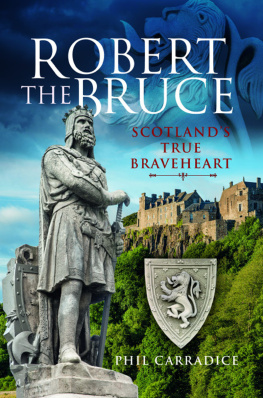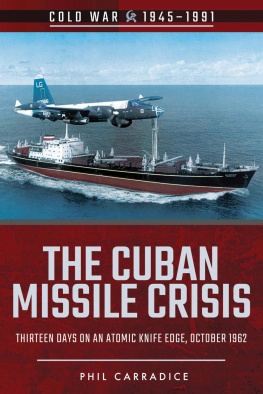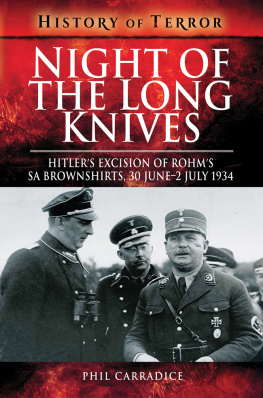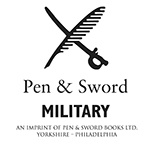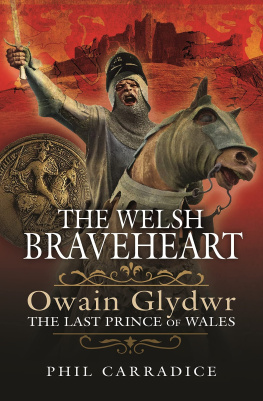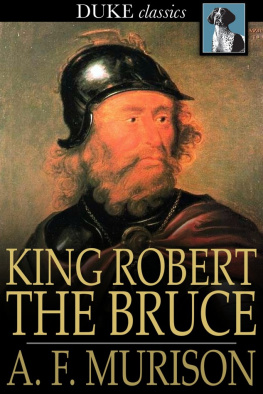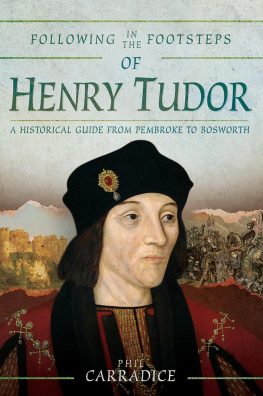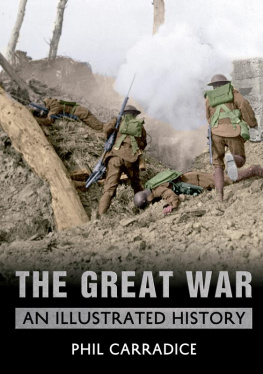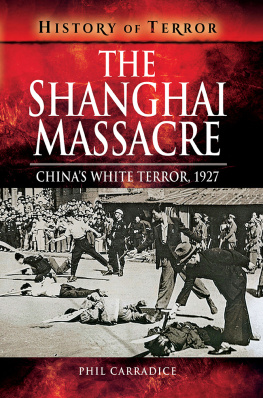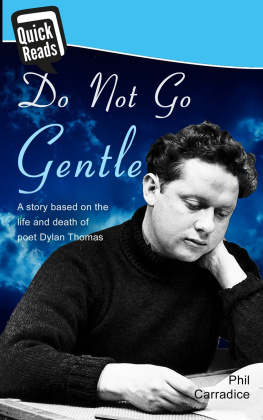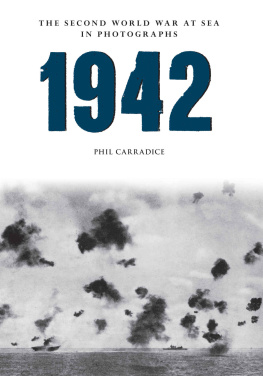Phil Carradice - Robert the Bruce
Here you can read online Phil Carradice - Robert the Bruce full text of the book (entire story) in english for free. Download pdf and epub, get meaning, cover and reviews about this ebook. year: 2022, publisher: Casemate Publishers & Book Distributors, LLC, genre: Non-fiction. Description of the work, (preface) as well as reviews are available. Best literature library LitArk.com created for fans of good reading and offers a wide selection of genres:
Romance novel
Science fiction
Adventure
Detective
Science
History
Home and family
Prose
Art
Politics
Computer
Non-fiction
Religion
Business
Children
Humor
Choose a favorite category and find really read worthwhile books. Enjoy immersion in the world of imagination, feel the emotions of the characters or learn something new for yourself, make an fascinating discovery.
- Book:Robert the Bruce
- Author:
- Publisher:Casemate Publishers & Book Distributors, LLC
- Genre:
- Year:2022
- Rating:3 / 5
- Favourites:Add to favourites
- Your mark:
- 60
- 1
- 2
- 3
- 4
- 5
Robert the Bruce: summary, description and annotation
We offer to read an annotation, description, summary or preface (depends on what the author of the book "Robert the Bruce" wrote himself). If you haven't found the necessary information about the book — write in the comments, we will try to find it.
Robert the Bruce — read online for free the complete book (whole text) full work
Below is the text of the book, divided by pages. System saving the place of the last page read, allows you to conveniently read the book "Robert the Bruce" online for free, without having to search again every time where you left off. Put a bookmark, and you can go to the page where you finished reading at any time.
Font size:
Interval:
Bookmark:

ROBERT
THE
BRUCE
SCOTLANDS TRUE
BRAVEHEART
PHIL CARRADICE

First published in Great Britain in 2022 by
PEN AND SWORD HISTORY
An imprint of
Pen & Sword Books Ltd
Yorkshire Philadelphia
Copyright Phil Carradice, 2022
ISBN 978 1 39900 260 8
ePUB ISBN 978 1 39900 261 5
The right of Phil Carradice to be identified as Author of this work has been asserted by him in accordance with the Copyright, Designs and Patents Act 1988.
A CIP catalogue record for this book is available from the British Library.
All rights reserved. No part of this book may be reproduced or transmitted in any form or by any means, electronic or mechanical including photocopying, recording or by any information storage and retrieval system, without permission from the Publisher in writing.
Pen & Sword Books Limited incorporates the imprints of Atlas, Archaeology, Aviation, Discovery, Family History, Fiction, History, Maritime, Military, Military Classics, Politics, Select, Transport, True Crime, Air World, Frontline Publishing, Leo Cooper, Remember When, Seaforth Publishing, The Praetorian Press, Wharncliffe Local History, Wharncliffe Transport, Wharncliffe True Crime and White Owl.
For a complete list of Pen & Sword titles please contact
PEN & SWORD BOOKS LIMITED
47 Church Street, Barnsley, South Yorkshire, S70 2AS, England
E-mail:
Website: www.pen-and-sword.co.uk
Or
PEN AND SWORD BOOKS
1950 Lawrence Rd, Havertown, PA 19083, USA
E-mail:
Website: www.penandswordbooks.com
Firstly, to my father, a passionate Scot, who rated Robert the Bruce second only to his all-time hero William Wallace and who was certainly more significant than Edward Longshanks. Long evenings in front of that roaring log fire in far-off Pembrokeshire as we debated and discussed the campaigns, the times and the people involved, helped cultivate my own interest. Thanks Dad, I only hope you would think this effort worthy of your enthusiasm.
As ever, my darling Trudy, there at the books inception, there at its end. I still need you Trudy, always will.
My Scottish ancestors from Elgin and from Castle Douglas. You kept my interest in all things Scottish alive and breathing even though you knew, at heart, that I was a proud Welshman through and through. In particular my grandfather yet another Scot who went by the name of Robert who walked and talked me over the field of Bannockburn when I was still little more than a boy. He knew exactly what he was doing and when I returned to Stirling as part of the research for this book, I felt that gentle old man there, at my elbow, still guiding me.
The name Robert the Bruce, rather than the modern variation of Robert Bruce, has been employed throughout this book when describing its subject, the King of Scotland. Occasionally this has been shortened to the Bruce. Other family members, his father and others before him, have been allotted the term Robert Bruce. This has been done to avoid confusion over the names of the man himself and his ancestors.
There were, in all, six Roberts in the Bruce family before the most famous of them all appeared on the scene to become the seventh. The family was originally of French/Norman origin and the man who accompanied William to Britain in 1066 was Adam de Brus no Robert there, you will note.
When David, his overlord, became King of Scotland in 1124, Adam de Bruss son, Adam (born 1105), was granted the lordship of Annandale and the Bruce family connection with Scotland began. Those connections were long and dynamic, culminating in the life and career of the greatest Bruce of them all.
So, Robert the Bruce it is.
Treason, truce and treachery three all-encompassing words that can be used, more or less accurately, to describe the life and times of Robert the Bruce.
In the years leading up to the Battle of Bannockburn, fought in the warm summer of 1314, the Scottish king was regularly subjected to the rigours and tribulations of all three. It was not entirely one-way traffic, however, and in no small degree the Bruce gave back to his enemies as good as he got. Eventually, of course, he gave back more, a lot, lot more.
The final years of the thirteenth century, particularly in the period following the death of King Alexander III, were a time of worry and war in Scotland. It was a period when Edward I, as bloody and pragmatic a monarch ever to sit on the throne of England, sought to extend his control over the whole of Britain. If he could not achieve this by debate or discussion, Edward was clear that he would turn to mortal combat in order to solve the problem and obtain the desired result.
It was a confused and confusing time, when men changed their allegiances seemingly on a whim; when, at the drop of a hat, kings were set up on puppet thrones and deposed just as swiftly; when murder and mayhem mixed together in wars that were as much about personal ambition as they were about the safety of nations. It was the time of Robert the Bruce and his brother Edward, of King Edward Longshanks and his son Edward II.
Ostensibly, Edward Is rampant desire to extend his territories was part of his urge to reduce the danger of hostile elements on Englands borders. That, at least, was the public message, the face of his manoeuvrings and policies. There is an element of truth in the idea. There is no doubt that a united Britain would provide the English monarchy with security and strength where and when they really needed them against enemies on the continent of Europe.
The English monarchy in the fourteenth century was rooted in French culture and traditions with French still being the common language of court. The Plantagenet dynasty came from France and early members of that ruling house had governed over an enormous empire which stretched from the Scottish hills in the north to the Swiss Alps in the south.
The huge empire had only recently been lost large portions of it, at least thanks mainly to the inadequacies and foolishness of King John. However, the thought of reclaiming it was never far from the mind of John or his successors, Edward I in particular.
Security at home was an essential element in the political manoeuvrings of this able but single-minded monarch and this, of course, meant that independent countries like Wales and Scotland, both of which had the propensity, if not the military hardware, to wage war in the English rear, were bound to have limited shelf life. Both countries were too close to the English homeland to survive, intact, for long.
Llywelyn the Last, Prince of Gwynedd and Wales, was the first target for Edward Longshanks but he burned too quickly, like a moth caught in the candle flame, to be considered a major player in the wars that the English foisted on Britain in the thirteenth and fourteenth centuries. Within a few brief but bloody years, Llywelyn moved from target to victim.
That left just three dominant figures from the period Edward I and Edward II, kings of England, and Robert the Bruce, who went on to become King of the Scots. Of course, they were individual rulers and leaders in their own right, but when all is said and done, the three men have to be spoken of together.
There can be no apologies for looking, in particular, at Robert the Bruce and English King Edward I, if not as a unit, then at least as one item in an almost perpetual period of conflict. Of course, Edward II was a player in the drama but his achievements fade into insignificance when compared to the other two. Like their respective countries, Robert the Bruce and Edward I were inextricably linked and any appraisal of one cannot be accurately made without some assessment of the other.
Font size:
Interval:
Bookmark:
Similar books «Robert the Bruce»
Look at similar books to Robert the Bruce. We have selected literature similar in name and meaning in the hope of providing readers with more options to find new, interesting, not yet read works.
Discussion, reviews of the book Robert the Bruce and just readers' own opinions. Leave your comments, write what you think about the work, its meaning or the main characters. Specify what exactly you liked and what you didn't like, and why you think so.

